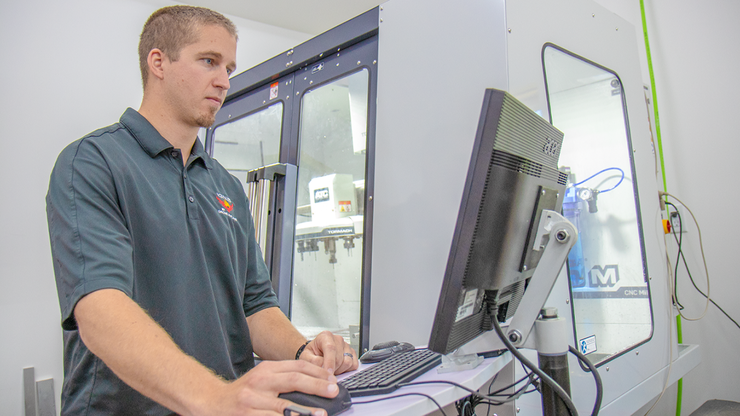· 5 min read
Husker startup brings firefighting drones to market

As fire seasons stretch longer and blazes burn hotter, a University of Nebraska–Lincoln startup company is using drones to fight fire with fire and keep people out of harm’s way.
Drone Amplified is headed by Carrick Detweiler, associate professor of computer science and engineering. The company’s drone-mounted technology carries chemical spheres the size of pingpong balls. At the press of a button, the spheres drop and ignite — intentionally sparking small fires that burn vegetation and starve incoming wildfires of potential fuel.
“Our product fills a niche in the market between a helicopter, which is expensive, and hand lighting, where people have to walk or take a four-wheeler,” said Jim Higgins, chief engineer and Nebraska alumnus. “It allows crews to ignite large, complex burns without the danger factor.”
To make the drone system easier to use, the team has developed a custom software application to automate every task: mission duration, altitude, where to drop the spheres, how many to drop and the time in between each. The app also allows users to create geofences, virtual boundaries that keep the drone within select areas.
The system includes a thermal camera, which aids visibility and introduces a new option for firefighting crews: nighttime operations. These operations are generally considered off limits due to low visibility.
“It’s normally too dangerous to fly at night over a fire, but with this drone, there’s no possible risk to human life,” Detweiler said. “It provides situational awareness at night to safely fly and ignite burns, which really gives ground crews an advantage during the daytime.”
Users from the federal government, private companies and nonprofit organizations have provided input on the drone system and its software. The team then uses this feedback to develop new features, such as offline elevation maps, which help users fly over mountainous terrain.
“We get a lot of great responses from customers about these small features, which really makes the system work better for them,” said Evan Beachly, chief app developer, who is also a Nebraska graduate. “Our software adds autonomy and mission planning, allowing users to set it all up and press ‘go.’”
The team has seen users discover these benefits firsthand. At the 2018 Klondike fire in Oregon, firefighters were initially hesitant to start using the drone, says Higgins — but by the end of a month-long deployment, they were regularly requesting to fly it as part of their daily operations.
Higgins has conducted training for employees from multiple federal agencies, who have since used the drone system to fight fires in Arizona, Alaska and other sites around the country. The team also has a strong partnership with the U.S. Department of Interior; in 2017, the agency named their technology one of the “Top 12 Made in America” inventions.
For its next steps, the team is focused on scaling its business to reach more customers — especially due to recent fatalities involving firefighting helicopters, which is driving an urgency to find safer replacements, says Higgins. To date, the team has sold several dozen systems to companies in the United States, as well as internationally.
According to CEO Detweiler, the team’s business success has benefitted from local investment by organizations including Invest Nebraska, Nebraska Angels and Nelnet, as well as grant awards from the Nebraska Department of Economic Development and the Small Business Innovation Research program.
“Nebraska has a very supportive startup community, with a lot of people who want to see success locally,” Detweiler said. “This investment gives us the ability to be a little more strategic and think about where we should be spending time, especially because we work with federal customers in a highly regulated area.”
The team has also worked with NUtech Ventures, the university’s commercialization affiliate, to patent and license the technology for their startup company.
“NUtech was really supportive throughout the process,” Detweiler said. “They helped us lay out the milestones and what we need to be thinking about in the future.”
While Drone Amplified’s product represents a distinctly different way to fight fires, the team foresees drones becoming a standard tool, as normal as picking up a firehose or calling in a bulldozer. It’s a vision they’re working to fulfill.
“I think we’re right at the leading edge of this wave of using unmanned systems in firefighting,” Detweiler said. “We want to save the lives of people doing very dangerous jobs.”









